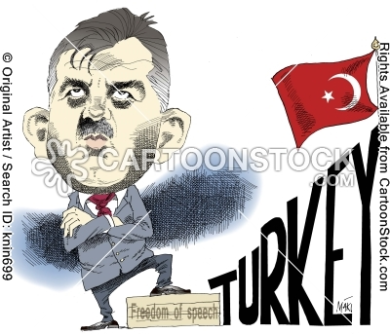Did you know that in April of 2011 there were 138 words banned from Turkish internet domains? No? Me either! What is even crazier is that some of the words that were banned are as common as the Turkish word for “crispy” and “adult”. In April of 2011 I was about a month away from graduating high school, so if this was a big story back then my “senioritis” is to blame for my total lack of knowledge on this matter.
My first thought was, “Why did these words get banned from being used in site domain names”? The initial article I read about the matter on bianet.org did not give a reason so I began to research the topic further online. Unfortunately, I was unable to find a concrete answer primarily because it did not seem like the Turkish Government had given one. An article written on hurriyetdailynews.com provided a clearer picture than the first article as to the grievances being raised by internet sites that would be effected and possibly facing closure because of the ban. The article also explained that the TiB (Turkish Telecommunications Directorate) had no legal grounds for forbidding these words from use.
As I said above, I did not have prior knowledge of this situation. However, I cannot say I was entirely surprised to read that this had happened. Growing up in a world post 9/11 it has been drilled into me by the media that middle eastern governments are”backward”, “tyrannical” and “controlling”. Therefore I have become desensitized to any information proving those assumptions. I know that not all middle eastern governments possess these qualities and I hope as I continue on in this course I will learn that the majority don’t. For the time being though reading that the Turkish government is taking away an aspect of freedom of speech, that we here in American enjoy without given the matter a second thought, does not shock me.
The way in which this story was presented on an online news site was successful in that in got the main point across in a direct and clear manner. However, it did leave the reader with a lot of questions so I had to go searching somewhere else to find a more comprehensive article on the issue. The author of the bianet.org article also referenced a “Law No. 4982″a couple of times but never said what this law entails. This again led to questions that could only be answered by further research into the topic. The two other articles I found most useful were more detailed and explanatory as far as the technical terms being used to discuss the banning. I also felt that the article on hurriyetdailynews.com read more fluidly and eloquently and therefore I enjoyed that article more. This prompted me to explore around their website. Which is what I believe online article authors hope their readers will do.

I think this topic is really interesting and you make a lot of good points. For these reasons, I chose your article for my blog review.
I find this story funny [in a “you have got to be kidding” sort of way. In April of 2011 I was a sophomore at college and a Political Science major, yet I did not hear anything about this story. It always fascinates me to hear to situations of this magnitude, because instead of this story circulating I heard more about the switching of the N-word to Slave in The Adventures of Tom Sawyer and Huckleberry Finn and things of this nature [which occurred around the same timeframe]. I find fascinating as it also gives me a glimpse into the lives of a workings of a country that I know little about.
look at my blog for on my take on this story and the 4982 Law. http://nesciig.wordpress.com/